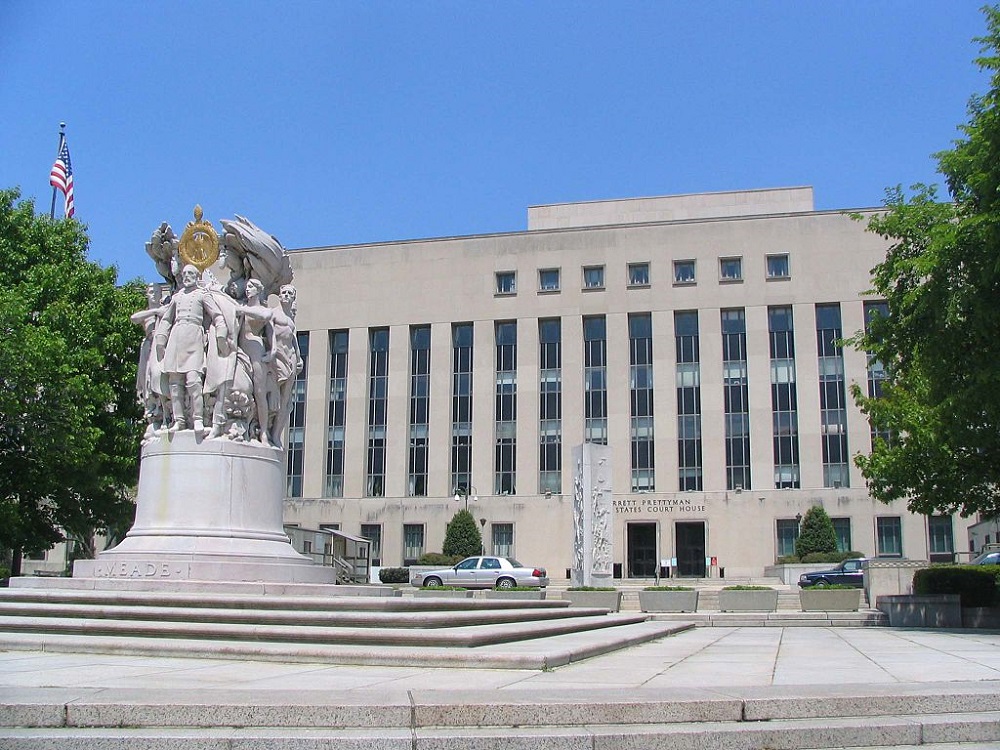The D.C. Circuit’s Opinion in the Mystery Subpoena Case: Unresolved Personal Jurisdiction Issues
On Jan. 8, the U.S. Court of Appeals for the D.C. Circuit released its redacted opinion In re Grand Jury Subpoena, the mysterious case with apparent links to the Mueller investigation concerning an unnamed corporation (“the Corporation”) owned by an unnamed foreign country.

Published by The Lawfare Institute
in Cooperation With

On Jan. 8, the U.S. Court of Appeals for the D.C. Circuit released its redacted opinion In re Grand Jury Subpoena, the mysterious case with apparent links to the Mueller investigation concerning an unnamed corporation (“the Corporation”) owned by an unnamed foreign country. The opinion, like the brief judgment released by the court on Dec. 18, 2018, does not decide the important question of whether or not the Foreign Sovereign Immunities Act (FSIA) affords immunity to foreign states and state-owned enterprises in criminal cases. Even assuming that the FSIA does apply in criminal cases, the opinion reasons, the commercial activity exception to immunity applies and the Corporation is not entitled to immunity from the district court’s subpoena power. Note that this position assumes that common law immunity, which would apply if the FSIA does not, would also not protect the Corporation from the subpoena.
Judge Stephen Williams penned a concurrence agreeing that the commercial activity exception under 28 U.S.C. §1605 (a)(2) applied, assuming that the FSIA applies, but arguing that the court should rely on a different clause of the exception. The portions of the opinion relating to the actual commercial conduct of the Corporation are redacted, so it is hard to determine who has the better of the argument. Judge Williams’ opinion raises questions about personal jurisdiction with implications far beyond this case, however.
§1605 (a)(2) reads:
A foreign state shall not be immune from the jurisdiction of courts of the United States or of the States in any case … in which the action is based [1] upon a commercial activity carried on in the United States by the foreign state; or [2] upon an act performed in the United States in connection with a commercial activity of the foreign state elsewhere; or [3] upon an act outside the territory of the United States in connection with a commercial activity of the foreign state elsewhere and that act causes a direct effect in the United States[.]
The majority relies on clause three, which denies immunity in an action that is based upon “an act outside the territory of the United States in connection with a commercial activity of the foreign state elsewhere [when] that act causes a direct effect in the United States.” Judge Williams, in contrast, pointed to the first clause. The public does not know the facts that led the majority to conclude that the language of the third clause was satisfied, nor do we know why Judge Williams preferred to rely on the first clause.
The majority does acknowledge difficulty applying the “based upon” requirement in the context of a subpoena. The Supreme Court has said that courts should look to the “gravamen” of the action—in this case, the subpoena—to determine the conduct upon which the action is based, a test with unclear results in some situations. The majority notes that:
Just how we apply this test in the context of a subpoena is not immediately obvious. The “gravamen” of a subpoena may be the mere fact that an entity possesses the documents in question. Alternatively, the “gravamen” may be related to the content of the records and why they may be relevant to the government’s investigation.
In a heavily redacted part of the opinion, the majority concludes that it does not matter how “gravamen” is interpreted in this case because the government has made an adequate showing under either alternative.
Judge Williams relies upon the first clause of § 1605(a)(2), which denies immunity if the action is based not upon an “act” with a direct effect in the United States, but instead upon a “commercial activity carried on in the United States by the foreign state.” Judge Williams reasons that this exception to immunity depends upon general, rather than specific, personal jurisdiction over the defendant. Citing the government’s brief, Williams argues that the general commercial activity of the corporation in the United States, not any specific relationship between the subpoena itself and the United States, is what supplies the necessary “minimum contacts.” But, he reasons, these contacts are not enough to confer personal jurisdiction under the Court’s recent case law. General business contacts no longer suffice for general jurisdiction, as the Supreme Court made abundantly clear in Daimler AG v. Bauman. Williams reasons that the lack of personal jurisdiction would make clause one of § 1605(a)(2) inapplicable—except, he writes, that the Corporation did not make any argument about personal jurisdiction. The issue was briefed by the government, but the unnamed Corporation responded in only the most cursory terms. Therefore, Williams argues, general personal jurisdiction requirements were satisfied, making clause one applicable.
The personal jurisdiction analysis raises several interesting questions, including whether foreign sovereigns are protected by due process at all; the constitutional distinction between state-owned-enterprises (SOEs) and foreign states; and the applicability of due process minimum contacts limitations in criminal cases. Under D.C. Circuit precedent, based upon dicta from the Supreme Court, foreign states have no due process rights. The mystery Corporation, we know from the Dec.18 D.C. Circuit opinion, falls within the act’s definition of a “foreign state” under 28 U.S.C. § 1603(a), (b)(2), apparently qualifying as an agency or instrumentality because it is owned by the foreign state itself. But is the SOE a foreign state or a foreign corporation for constitutional purposes? After all, the “minimum contacts” requirement that Judge Williams discusses is one imposed by the Fifth Amendment Due Process Clause, although the opinion does not say as much. Private corporations have Fifth Amendment due process rights, foreign states do not—or at least that is what the lower courts have held.
Under D.C. Circuit precedent, foreign states and their separately-incorporated enterprises are treated as distinct entities for personal jurisdiction purposes unless a veil-piercing analysis is satisfied. In this case, that would appear to mean that the Corporation is entitled to personal jurisdiction protections, unless the foreign state exercises a high level of control over its operations such that the corporation should be treated as the state itself. Why didn’t the Corporation make the personal jurisdiction argument? It is hard to know, but one possibility is that it wanted to avoid discovery on the veil-piercing issue, or because it viewed the argument as unlikely to succeed.
Judge Williams wrestled with personal jurisdiction and SOEs in an important 2012 case, GSS Group, Ltd. v. National Port Authority. His concurring opinion raised several arguments against using the federal common law veil-piercing analysis to distinguish between corporations with personal jurisdiction protections and foreign corporations without personal jurisdiction protections under the Constitution. The federal common law test is based on the Bancec case (First National City Bank v. Banco Para el Comercio Exterior de Cuba), and Judge Williams provided some strong reasons to question Bancec’s application to constitutional issues. One solution suggested by Williams’ GSS Group concurrence is to conclude that due process does not protect any foreign corporations at all (as argued by Austen Parrish here). That argument would make it unnecessary to draw a constitutional distinction between SOEs and foreign states, because both would lack due process protections. That argument is, however, in tension with the Supreme Court’s decisions in Asahi Metal Ind. Co. v. Superior Co., Nicastro v. J. McIntyre, Daimler AG v. Bauman, which held that foreign corporations do have Fourteenth Amendment due process rights (although those cases did not resolve the Fifth Amendment issue). There is another possibility, however: Fifth Amendment due process and other constitutional rights may apply to foreign states just as they do to private corporations, eliminating the constitutional distinction between the two kinds of entities. That argument, which I believe is correct, would not require reversal of any Supreme Court cases, although it is (as noted) contrary to cases in the D.C. Circuit and other appellate courts.
The third issue is whether the “minimum contacts” due process test from civil cases should apply at all to criminal prosecutions (against any kind of defendant). If it does not, criminal prosecutions can go forward against defendants with little or no connection to the United States, assuming that venue and other requirements are met. Minimum contacts are of enhanced importance in criminal cases against corporations because of recent amendments to Federal Rule of Criminal Procedure 4(c)(3)(D)(ii) making it easier to serve process on foreign corporate entities . The D.C. Circuit held In re Sealed Case, 832 F.2d 1268 (D.C. cir. 1987), that due process/minimum contacts limitations apply in the context of criminal subpoenas, as Judge Williams reasons in the In re Grand Jury opinion. But in substantive criminal prosecutions minimum contacts limitations may not apply. Writing in the Columbia Law Review, Michael Farbiarz argues that federal criminal prosecutions for extraterritorial conduct are not generally limited by minimum contacts-type analysis, although he argues that they should be. This area of inquiry is so interesting not only because of the obvious importance of the actual cases against the SOEs themselves, but also in how it brings together many unsatisfactory and unresolved personal jurisdiction issues. The Supreme Court has decided personal jurisdiction cases under its 14th Amendment “minimum contacts”/reasonableness test, but the doctrine created by those cases has been very widely criticized as incoherent. The Supreme Court has not resolved whether the Fifth Amendment has a “minimum contacts” requirement akin to the 14th Amendment. And then there are constitutional issues involving personal jurisdiction that arise in criminal cases, and in cases involving SOEs and foreign states. Lower court case law has developed in unfortunate ways in these areas, sometime based upon dicta by the Supreme Court. As new cases arise, the Supreme Court should tread carefully to avoid replicating errors and unnecessarily expanding unsatisfactory doctrine.


.jpg?sfvrsn=5a43131e_9)


